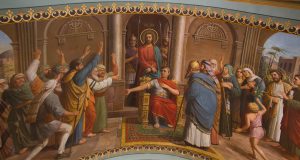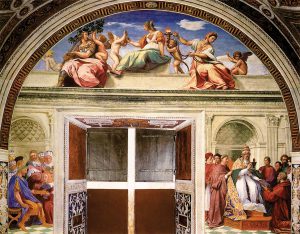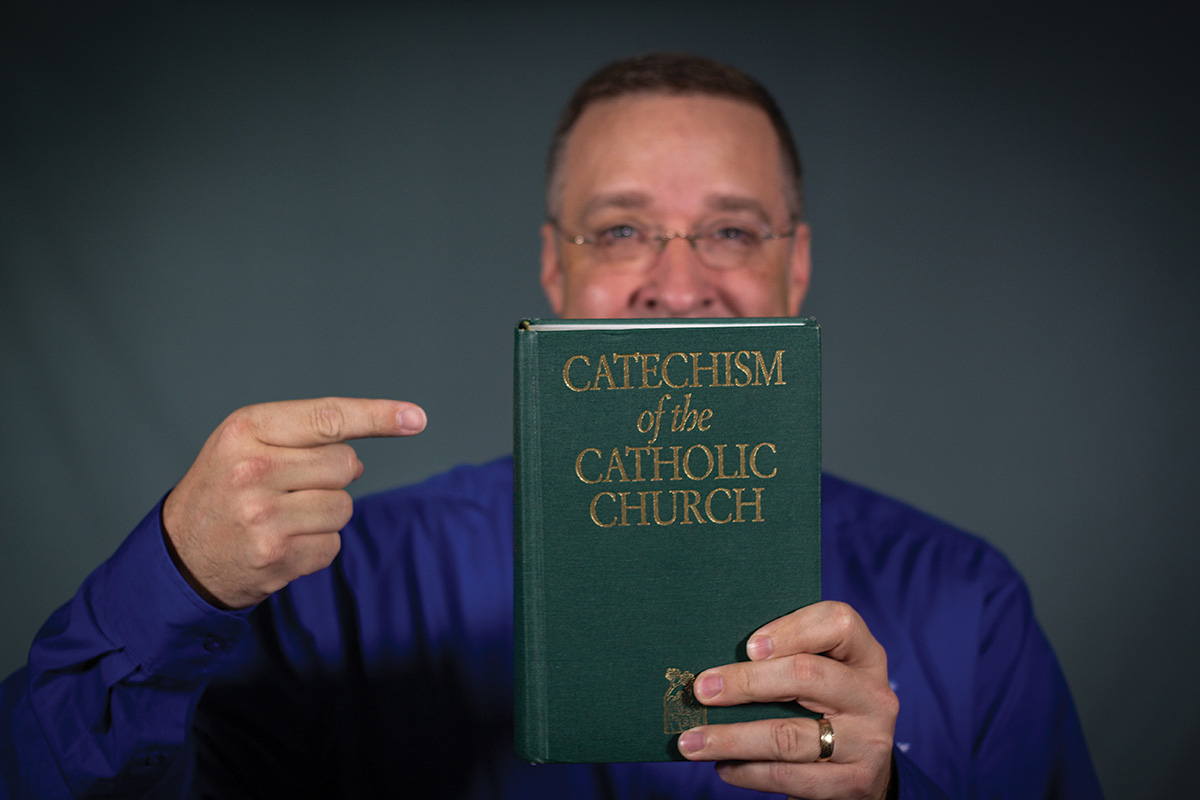
By Josie Bopp
Tell all your sins to a priest—regularly. You can’t get divorced. No eating meat on Fridays during Lent. Remember to follow the 10 Commandments. If you’re not Catholic, you’re probably going to hell. Oh, and don’t forget the big one: don’t have sex before marriage.
For many who grow up Catholic, the Church is sometimes characterized as one resounding “no.” The experience of faith is sometimes mistakenly reduced to a set of rules and regulations, with the sense that if all of them are followed, a good Catholic will stumble his or her way into heaven, arriving with the correct answers, albeit having lived a seemingly miserable life. Even for those outside the Church, a caricature of the law-obsessed Catholic Church prevails.
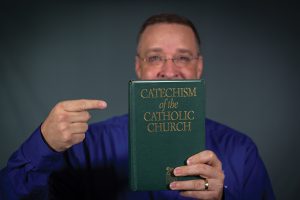
Dr. Chris Burgwald, director of Discipleship Formation for the diocese, says that especially for cradle Catholics (those who grew up in the Church), there can be an emphasis on the “thou shalt not’s,” with little understanding of why.
“Whether they’re said more often or we hear them more often, we fixate on the ‘no’s,’” he says. “But we then lose sight of the ‘yes’ being offered.”
As American Catholics in particular, we have in many ways more easily fallen prey to the “this is what we do, just do it” mentality that has persisted in the culture in other ways. Over the years, as people begin to ask important questions, the answers have sometimes become difficult to produce, despite Catholic schools and parish religious education programs. We didn’t lead with the “why” Chris says.
Yet, he says two of the most important questions we can ask in our faith journey are “Why?” and “So, what?”—touching upon what he calls the rationale and the relevance of faith.
“Some of us love truth for its own sake, but many of us need to be shown the relevance of truth to our lives,” he says.
Whether from outside cultural influences or inside influences of poor catechesis or pastoral insensitivity, Catholics sometimes find themselves as adults, having gone through formation during their adolescent and teen years, with unanswered questions and misconceptions about what their own Church teaches.
The unanswered “why” of the faith is what kept Rosalyn, a parishioner at Holy Spirit Parish in Sioux Falls, from fully embracing all aspects of the Church’s teaching on contraception. Having grown up Catholic, Rosalyn knew the Church’s stance on contraception, but used it during the early part of her relationship with her now-husband, with whom she had lived before marriage. She said it was just a common thing in the culture and it seemed okay, even right.
“That was the thinking at the time, that this is what you do and so I thought, that’s what I’m going to do,” Rosalyn said. “You just shut yourself off to the truth because you don’t want to know the truth in a lot of ways, so you continue to go on about your life and try to pretend that truth doesn’t exist.”
Rosalyn said she and her husband continued to attend Mass regularly and wanted to remain in the Church. At one point, good friends had approached them about the topic, and even though they didn’t listen, Rosalyn says it always stayed with her.
“I always used the excuse that ‘we love each other, we’re doing this out of love, and so surely God will be okay with it because it’s a loving relationship,’” Rosalyn said. “So there’s that big ‘it’s all about love’ trap that we can fall into.”
The difficult issues
A Pew Research Center study, originally published in 2009 and updated in 2011, found that of those who have left the Catholic Church as adults, more than half cited dissatisfaction with Catholic teachings about abortion and homosexuality, and 48 percent cited dissatisfaction with church teachings about birth control as reasons for leaving.
Certainly, social issues surrounding human sexuality have played an increasingly important role in society. Yet, the Catholic Church has remained unwavering in her approach to many of the so-called hot button issues of the day, from chastity to contraception to gay marriage, and the idea that the Church is all about what can’t or shouldn’t be done prevails.
Chris says many of the questions in today’s culture boil down to, “Why did God give us the gift of human sexuality and sex?”
“Biblical religion has always taught that it is about life and love,” he says. “We see this biologically: sex is ordered towards procreation, of the generation of new children. It’s not just that, but it’s also about the union of the spouses.”
Many of the difficult issues Catholics may wrestle with today, including sex before marriage, contraception, in vitro fertilization and homosexual unions are a fracture or a separation of that principle—that sex is about life and love. God’s will is that both human love and human life would be united in the marital act, Chris says.
In “Theology of the Body,” Saint John Paul II’s teaching on human sexuality, he sheds light on the profundity of this aspect of human dignity and helps bring about an understanding of why some of the common “no’s” that are often heard ultimately lead to that greater “yes.” These teachings gained greater traction and popularity in the late 1990s and early 2000s.
“Human sexuality goes to the heart of who we are and where we find our identity, dignity, value and worth,” John Paul II said. Which is why for many people, the increasingly radical counter-cultural aspect of the Church’s teachings on human sexuality and relationships can be hard to accept.
Among those most difficult to accept for many is homosexual unions. Chris says a huge aspect of the misunderstanding of the Church’s teaching on why individuals with same-sex attraction cannot be married is due to a fundamental misunderstanding of what marriage actually is. Even though culturally marriage has become a way for people to express their deep love and affection for one another, it has historically been ordered to procreation and love.
“Marriage is about a man and a woman coming together and growing in love and that being the context in which they raise a family,” Chris says.
As with sex before marriage, contraception and in vitro fertilization, homosexual unions represent a fracture of the two fundamental precepts of marriage and human sexuality, specifically that of procreation and union of spouses. Instead of no sex before marriage, no contraception, and no homosexual unions, the Church is actually saying yes to something better, something that brings freedom.
For Rosalyn, it was beginning marriage preparation classes and taking a course in Natural Family Planning (NFP) that started answering the why behind the Church’s stance on contraception and cohabitation before marriage.
“I had never heard the reasons behind not using it—the full reasons—and I had never been told some of the ways the pill, for example, can end a very early pregnancy,” Rosalyn said. “It was after that when I said to myself, ‘Okay, we’re done with this, we’re not doing this anymore.’”
With the support of her husband and the guidance of the priest who was counseling them for marriage prep, Rosalyn and her husband changed their living situation and got back on a path more in line with church teaching.
“The NFP class really kind of marked a turning point for me that grew as we moved on in our marriage prep and in our married life that really fed us as a married couple,” she said. “Even though we did the wrong things in the beginning, by diving in and being more faithful Catholics, it helped us to overcome that as we started our marriage.”
One big yes
So, what is the “yes” being offered? Heather Eichholz, director of the Marriage Tribunal for the diocese, works with individuals seeking what is called a declaration of invalidity regarding their sacramental marriage, more commonly known as an annulment. In her line of work, she deals with many misconceptions of the Church, especially the teachings on marriage and divorce.
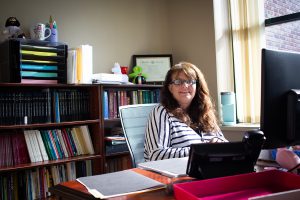
“In reality, the Church very seldom says no,” Heather says. “My office is the prime example of the Church saying that we understand humanity is broken, and we understand that because of our imperfections, life happens. Here is how we are going to demonstrate God’s mercy and love to you.”
Divorce, remarriage and the ensuing issues can be difficult for Catholics as so many individuals and families have all-too-close experiences with them. Again, Heather says many of the misconceptions come from that fundamental misunderstanding of what marriage is.
“It’s a matter of covenant versus contract,” she says. “When you enter marriage, the Catholic Church says you are entering a covenant relationship. A covenant goes on indefinitely and nothing breaks it.”
When a couple takes their vows, Heather says the Church wants them to freely, with prudence, make that decision for life. Because we’re human and because we’re broken, things happen, she says. But the Church is where we go to receive healing for our brokenness and receive God’s grace.
“It’s almost like we have a rope,” she says. “And the rope is leading up to God. Every time we mess up, every time something goes wrong, every time we sin, the rope gets severed. God gave us grace and the sacraments so that rope gets tied into the knot. Every time we tie the knot, the rope gets shorter and it actually brings us closer to God.”
Beginning the annulment process is difficult for most people, and those who do approach the Church for one have many misunderstandings about what it will be like because they imagine the Church to be passing judgment upon them.
“A lot of times I have to explain that no, what we’re doing is we’re looking at circumstances in the marriage at the moment they said, ‘I do,’” Heather says. “It’s about how certain factors may have influenced that decision.”
Heather says she often reassures people that a civil divorce does not mean the marriage or the people involved fail. You cannot fail if you at least tried, she says. But beginning the annulment process may involve some discomfort in order to bring about the desired freedom.
“Coming to my office is like reopening a wound and letting everything flow from that wound again, and you can only reopen the wound when you’re ready,” she says.
In much the same way, the sacrament of confession, even though it is difficult and uncomfortable, brings about that greater freedom. And the idea of confessing one’s sins to a priest is difficult for many Catholics and widely misunderstood by those outside the Church.
Chris says he was away from the Church for a couple of years, and although it didn’t take long to get back into the practice, it wasn’t always easy.
“For me, there’s a psychological hurdle there,” Chris says. “I’m saying out loud to somebody else my faults and failings.”
Using the analogy of a broken arm, Chris says what happens is the doctor causes some pain to the patient while assessing and healing the arm. So it is with confession. While it might be painful to lay out the most difficult aspects of our personal lives, the healing can happen once we do.
“This is not the Church trying to make me feel bad about myself,” Chris says. “In fact, it’s the Church giving us this gift that God gave us by which I can not only be psychologically free, but also spiritually free from my faults and failings.”
For freedom
No matter the issue, from human sexuality to divorce and remarriage, confession and more, the perceived “no’s” of the Church actually lead to a greater “yes,” a yes to freedom and ultimately, happiness. This freedom is not simply the ability to choose whatever I like however and whenever, but rather a responsibility to pursue the good—to pursue God.
In contrasting the world’s view of freedom and the Church’s view of freedom, Saint John Paul II said, “True freedom is not advanced in the permissive society, which confuses freedom with license to do whatever, and which in the name of freedom proclaims a kind of general amorality. It is a caricature of freedom to claim that people are free to organize their lives with no reference to moral values, and to say that society does not have to ensure the protection and advancement of ethical values. Such an attitude is destructive of freedom and peace.”
In other words, freedom and the happiness that comes from it is in reference to something else—God and his teachings through the Church.
Chris says another word he uses for freedom is “mastery.” A master is someone who has disciplined themselves, practiced their craft or trade, and has become free to do it in the best way possible. A useful analogy Chris uses is that of learning a musical instrument.
“Who is more free: a violin bow in the hands of a 3-year-old, or the first-chair violinist of the New York Philharmonic Symphony?” he says.
The 3-year-old may look like they’re having more fun, but the result is fruitless and meaningless.
“Anybody who has become a master at whatever their craft, whatever their trade, they’ve done things in a very particular way; they haven’t done things however they wanted,” Chris says. “They did it in a way that was ordered towards mastery and in that, they found freedom.”
Chris says the Church gives us the owner’s manual for being human—the rules and disciplines for pursing a life of freedom, happiness, peace, joy and flourishing. The Church is just the transmitter, passing on to us what God has revealed about who we are and how we are meant to live, he says.
“God wants me to be happy,” Chris says. “And the teachings that he has given to us through the Church are the owner’s manual to the human person, and following those teachings is what gives me happiness and sets me free.”
And when it comes to teachings that are difficult or haven’t been explained, Chris says ask the “why” questions with openness and curiosity.
“Not every question of human experience can be answered, but why the Church teaches what she teaches? There is always an answer to that question,” Chris says.
To begin finding the answers, Chris says he recommends starting with your parish priest. But there are many resources available to begin the search, including the office of Evangelization and Catechesis at the diocese.
For Rosalyn and her husband, it was starting the conversation with their own parish priest that began the journey of diving deeper into the why’s of the faith. She said connecting with faithful Catholics and answering questions is another good way to begin.
“If you avoid that your whole life like I was during that time, it can often take you down the wrong path, but you can always come back from that path. It’s just so much easier to avoid it!” she says.
She and her husband have been married for nearly 20 years and have been blessed to have the mutual support necessary to take the journey to freedom, though she says she wishes she had known more earlier in order to avoid some of those pitfalls. Yet, she says it really is a matter of personal responsibility.
“The people of the Church are all sinners, and we’re all going to make mistakes,” she says. “Sometimes we just have to remember as faithful Catholics that our job is to know what the Church teaches, to understand how Jesus wants us to live our lives.”
Hope for the future
In her work at the Tribunal, Heather says she has great hope for Catholics in coming back from grappling with some of the difficult issues, even for Catholics who have left the practice of the faith for many years. She says Catholics yearn to come back eventually.
“It’s like a pull or a draw that they have and they hunger for that Eucharist, they yearn for that community,” she says. “We’re raised that way from the day we’re born. Being Catholic is more a verb than a noun.”
For Rosalyn, leaving the Church was never an option, even when grappling with some of the Church’s more difficult teachings.
“I knew that’s where I was supposed to be.”

